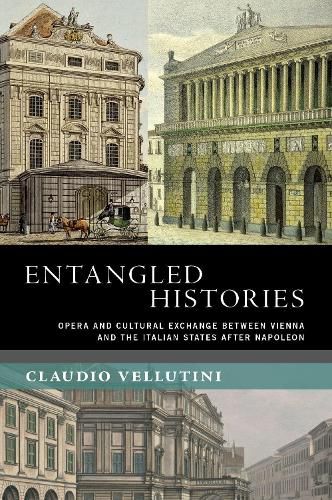Readings Newsletter
Become a Readings Member to make your shopping experience even easier.
Sign in or sign up for free!
You’re not far away from qualifying for FREE standard shipping within Australia
You’ve qualified for FREE standard shipping within Australia
The cart is loading…






Through a wealth of archival documents and printed materials, Entangled Histories shows how, over the first half of the nineteenth century, opera helped redefine questions of collective identity in the Austrian empire, serving as a testing ground for, among others, theories of language and education, notions of fatherland and citizenship, artistic expressions of cultural hybridity, new forms of managing economic and cultural capital, and practices of collective memory. By emphasizing the entanglements between opera's aesthetics, its social function, and the ideology underpinning its system of production in different institutional and urban contexts, this book places opera at the intersection of a broad set of political and cultural relationships that for several decades connected Vienna and prominent Italian operatic centers, contributing to a transnational historiography of the art form in the nineteenth century. It also argues that new modes of production and dissemination of opera between Vienna and the Italian states contributed to official cultural policies promoting a supranational identity of the Austrian empire-one that acknowledged, but ultimately transcended cultural differences. As the state emerged victoriously yet completely transformed from over two decades of wars against revolutionary and Napoleonic France, opera-with its long tradition of impresarios, composers, librettists, and performers on the move-became a key tool for bringing some of the different cultural traditions of the Austrian empire into a fruitful mutual dialogue.
$9.00 standard shipping within Australia
FREE standard shipping within Australia for orders over $100.00
Express & International shipping calculated at checkout
Through a wealth of archival documents and printed materials, Entangled Histories shows how, over the first half of the nineteenth century, opera helped redefine questions of collective identity in the Austrian empire, serving as a testing ground for, among others, theories of language and education, notions of fatherland and citizenship, artistic expressions of cultural hybridity, new forms of managing economic and cultural capital, and practices of collective memory. By emphasizing the entanglements between opera's aesthetics, its social function, and the ideology underpinning its system of production in different institutional and urban contexts, this book places opera at the intersection of a broad set of political and cultural relationships that for several decades connected Vienna and prominent Italian operatic centers, contributing to a transnational historiography of the art form in the nineteenth century. It also argues that new modes of production and dissemination of opera between Vienna and the Italian states contributed to official cultural policies promoting a supranational identity of the Austrian empire-one that acknowledged, but ultimately transcended cultural differences. As the state emerged victoriously yet completely transformed from over two decades of wars against revolutionary and Napoleonic France, opera-with its long tradition of impresarios, composers, librettists, and performers on the move-became a key tool for bringing some of the different cultural traditions of the Austrian empire into a fruitful mutual dialogue.